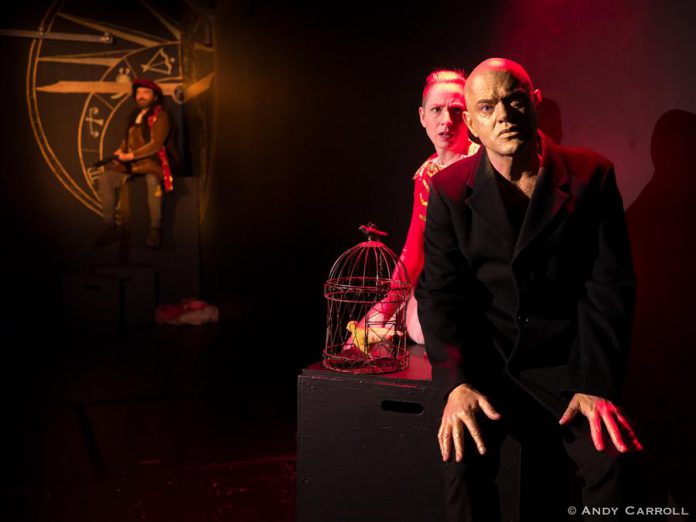
On Thursday, January 17th, The Theatre on King (TTOK) in downtown Peterborough presents its first drama of the year with French Dadaist playwright Georges Ribemont-Dessaignes’ The Mute Canary.
Written in 1919, The Mute Canary is directed by Ryan Kerr and performed by Matt Gilbert, Kate Story, and Dan Smith. A study in the difference between sex and power, the play — despite being written a century ago — eerily shadows the current political crisis in the U.S., making this show an extremely thought-provoking and relevant drama.
Little is known about the origins of The Mute Canary. Director Ryan Kerr discovered this odd piece of drama in a collection of Ribemont-Dessaignes’ works, including his other dramas The Emperor of China (1916) and The Executioner of Peru (1928).
A writer and artist, Ribemont-Dessaignes was a key player in the Paris Dada movement, and The Mute Canary has been called a high point in the Dadaists’ contribution to the theatre. The Dada movement, which developed in reaction to World War I, consisted of avant-garde artists who rejected the logic, reason, and aestheticism of modern capitalist society.
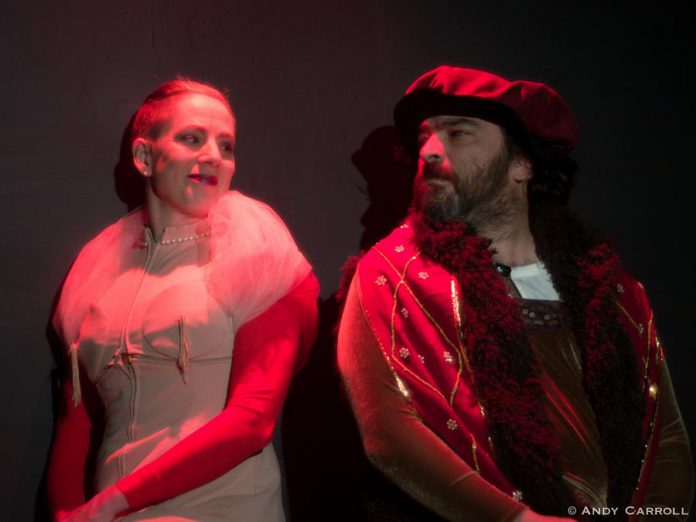
Described by Ryan as being Ribermont-Dessignes’ most “linear” productions, The Mute Canary is a show that is clearly ahead of its time, and deals with themes such as the battle between masculinity and femininity, xenophobia, misogyny, empty politics, feminism, hypersexuality, and the fragility of art and beauty. Yet the big surprise is that, while bleak, the play has a farcical quality that actually leaves the audience laughing.
Matt Gilbert plays Riquet and Kate Story plays his wife Barate. It’s unclear who these two characters are, but it’s clear what motivates them. Riquet is obsessed with politics and conflict, while Barate is hungry for sex.
Riquet goes hunting for an afternoon, leaving Barate at home. The two spend much of the play soliloquizing their individual thoughts on both world and sexual politics. Things come to a surreal climax when Barate comes across a strange composer named Ochre (Dan Smith) who arrives with a strange caged bird — a canary that cannot sing. As Barate becomes seduced by the tragic beauty of art, Riquet’s lust for conflict and destruction threatens to destroy the fragile world that has been created on stage.
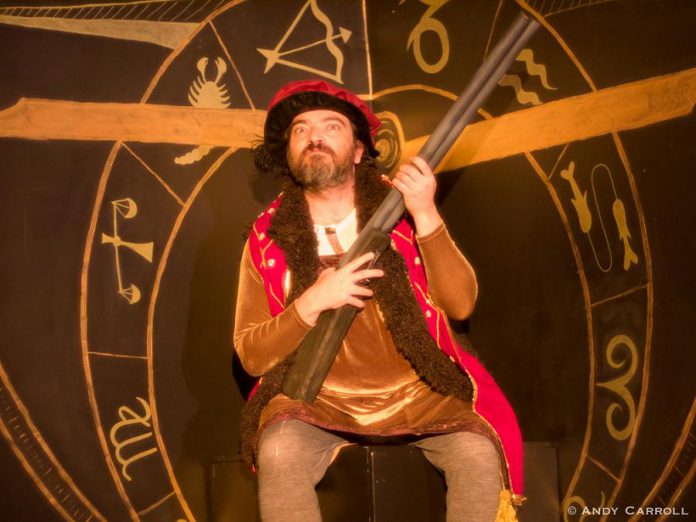
When Ryan Kerr decided to stage The Mute Canary, there’s no way he could have predicted the current U.S. government shutdown and Donald Trump’s current rhetoric about the border wall. With the current American crisis so prevalent in our world news today, The Mute Canary — and especially Matt Gilbert’s performance as Riquet — becomes a relevant piece of political theatre that satirizes the current U.S. president and the political crisis he has created. The play suggests that, although we like to believe our society has evolved, perhaps it hasn’t at all.
Sitting high on his perch overlooking the theatre, Matt Gilbert monologues empty politics with a false sense of importance. Armed with a gun, he is all-knowing and all-seeing but without any clear vision of the reality around him. Repugnant, arrogant, and foolish, he is intolerant towards allies and colonists, expresses hatred for the Turks, and chooses power and conflict over love and beauty and hatred over knowledge. Although expressed in an eloquent and poetic manner, Matt Gilbert’s lines read like Republican rhetoric and a cutting satire of President Trump.
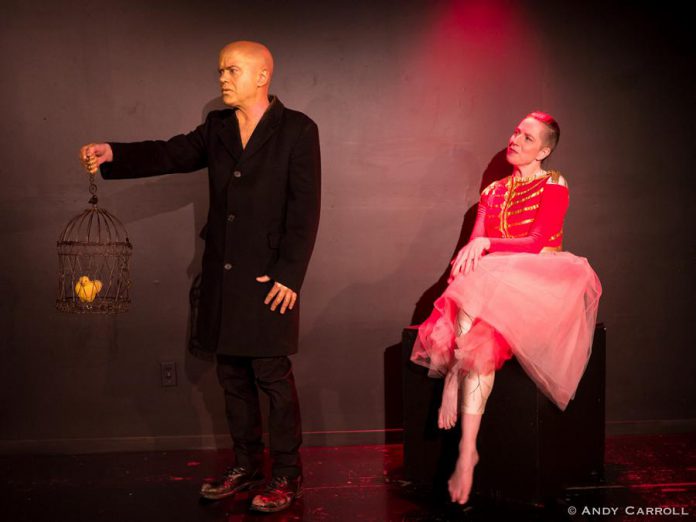
Kate Story also gives an interesting performance as Barate, Riquet’s neglected wife. As Kate said after the performance, Riquet’s and Barate’s motivations are pretty clear: if Riquet wants to hunt, Barate just wants to have sex.
But Kate’s piece is interesting for a number of reasons, especially when put in context of the time the play was written. As a dominant female character who speaks intelligently and bluntly about female sexuality, the role of Barate would have been risqué when performed one hundred years ago. Today, the character feels fresh and modern, making Barate a feminist decades before feminism. Kate also brings a great sense of physical comedy to the piece with her whimsical performance and wonderful moments where she showcases her ability as a dancer.
Dan Smith gives a strange yet oddly endearing performance as the composer Ochre. A parody of real-life French composer Charles Gournod, Ochre (along with his mute canary) becomes a symbol of art, beauty, and fulfillment. However, despite his attempt to bring a sense of sensitivity to the world, it becomes questionable if Ochre’s beauty and art has a place in a society filled with rampant toxicity.
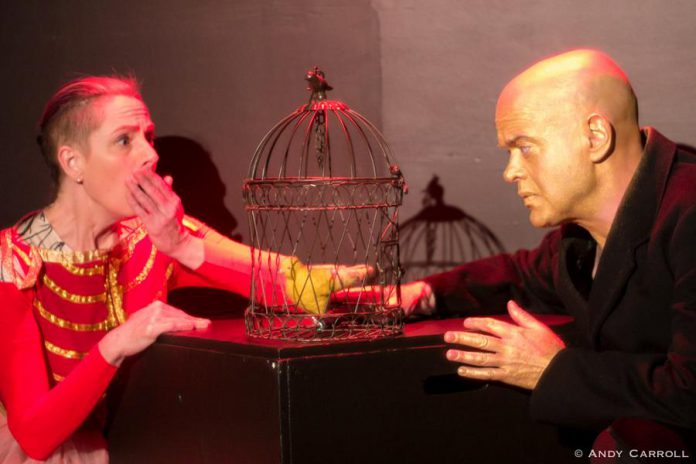
Once again, real-life modern parallels come into view with the fragility of artistic institutions in a political climate where irrationality seems to rule over reason. But, with Dan Smith’s signature brand of comedic timing and performance, Ochre also manages to bring some surreal laughs to the show.
The Mute Canary is a thought-provoking piece of political and social commentary, presented at the perfect moment in time to generate discussion. If this show were presented two months ago, it would have had a very different impact on the audience and, and if presented two months from now, the impact could change again.
But most of all, get ready to laugh. While it contains some heavy-handed material and is somewhat bleak, The Mute Canary is also a very funny piece of theatre. In a world that never ceases to be absurd, it is interesting to see how society is still concerned with the same issues one hundred years later.
The Mute Canary runs from Thursday, January 17th to Saturday, January 19th, with performances starting at 8 p.m. Admission is $15 at the door (or pay what you can).



























